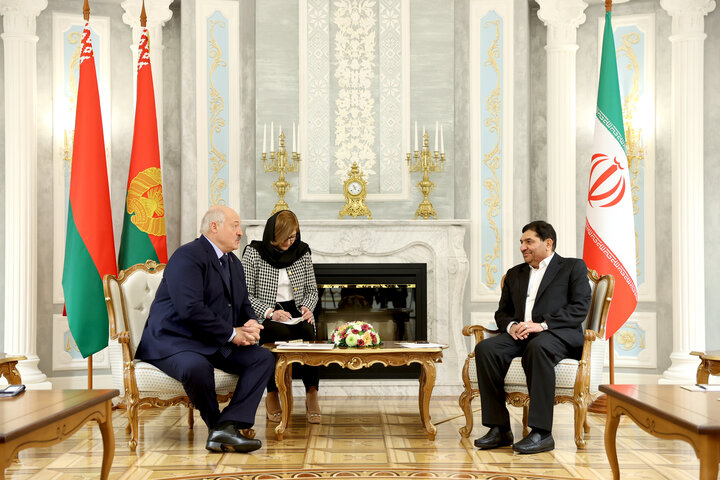Belarusian President Alexander Lukashenko has expressed his support for Iran in managing Western pressure.
According to him, the global situation is heating up, and the crisis in the Middle East is being exacerbated by unfriendly Western countries, led by the United States, constantly directing the focus of this conflict against Iran.
“You feel this better. Our response is the same: we must work more closely with each other, collaborate together to counter these provocations,” President Lukashenko said on October 17 during a meeting with Iranian First Vice-President Mohammad Mokhber in Minsk, as reported by the Belarusian news agency Belta.
The president described the “Western pressure” exerted on Belarus and Iran as “unprecedented.” At the same time, he also highlighted that Iran has “already learned to some extent how to resist this pressure”, and added that Tehran’s “experience is very important” to Minsk.
“What constantly surprises me is that during these large-scale actions over this period, Iran has not reduced its level of development at all but, on the contrary, has significantly increased it,” President Lukashenko said.
Earlier this year, the president of Belarus embarked on an official visit to Iran, where the two presidents laid the groundwork for a strategic action plan aimed at fostering more robust trade and comprehensive collaboration between their countries. As a result of their negotiations, Alexander Lukashenko and his Iranian counterpart Ebrahim Raisi signed a roadmap for bilateral cooperation spanning the years 2023 to 2026.
In 2022, Belarus-Iran trade exceeded $100 million, marking a threefold increase year-on-year. From January to August 2023, mutual trade reached $62.5 million, reflecting a 26 percent increase compared to the previous year. Belarus exports potash fertilizers, timber, pulp, and synthetic fibers to Iran, while importing Iranian vegetables, fruits, nuts, vaccines, blood, and blood serums.
Iran is also keen on developing relations with its close ally, Belarus, through international organizations such as the Shanghai Cooperation Organization and the Eurasian Economic Union.
In a separate meeting on October 17, the Chairman of the House of Representatives of the Belarusian Parliament, Vladimir Andreichenko, informed Iran’s First Vice President, Mohammad Mokhber, that Belarus and Iran are committed to the win-win principle in economic cooperation.
“And you know, despite the sanctions our trade exceeded $100 million last year. Now we need to keep it up. This matter has been discussed at the meetings with the president and the prime minister of our country today. I think that although your visit is brief, you will be able to assess our potential in industry, culture, and human resources. Our meetings and negotiations will help explore new possibilities to promote our cooperation,” Andreichenko said.
In turn, Mokhber said that Iran and Belarus are “the two countries that are subject to illegal, oppressive sanctions by the United States. But the Islamic Republic of Iran has been able to use the sanctions turning them into an opportunity.”
“We have achieved the highest results at a time of sanctions. We used to be dependent in many areas of the country’s life. Now Iran produces the most advanced military equipment,” the Iranian official said.
On July 31, Iranian Defence Minister Brig. Gen. Mohammad Reza Ashtiani and his Belarusian counterpart, Maj. Gen. Viktor Khrenin, signed a memorandum of understanding on defense cooperation in Tehran, the details of which have been kept confidential. Ashtiani foresees that defense cooperation, leveraging the capabilities of both countries, will contribute to establishing “peace, stability, and security” in the region.
On August 2, Chief of Staff of Iran’s Armed Forces Maj. Gen. Mohammad Hossein Baqeri voiced Iran’s readiness for military cooperation and holding joint drills with Belarus in a meeting with the visiting Belarusian Defense Minister Maj. Gen. Viktor Khrenin. Baqeri also discussed with the Belarusian minister the opening of military sections at their relevant embassies and called for expansion of Tehran-Minsk military cooperation as the “global power structure” was changing “from unipolar to multipolar.”
Iran and Belarus have faced accusations of supporting Russia in its war against Ukraine. Ukrainian media reported in May that Russia was investigating the potential for manufacturing Iranian drones in Belarus.
Criticism from Western nations has been aimed at Tehran for its support of Russia in the Ukrainian conflict, particularly in the provision of kamikaze drones. In parallel, Belarus permitted Russia to launch a portion of its invasion from its territory, offering Russia the shortest land route to Ukraine's capital, Kyiv. The situation along the Belarus-Ukraine border continues to be fraught, with Ukraine closing the border checkpoints leading into Belarus.







 President Ilham Aliyev shed light on the evolving contours of the peace process with Armenia during an international conference in Baku this week. ...
President Ilham Aliyev shed light on the evolving contours of the peace process with Armenia during an international conference in Baku this week. ...
 Azerbaijan and Armenia started the process of demarcation of their border on Tuesday, with the installation of the first border markers based on ge...
Azerbaijan and Armenia started the process of demarcation of their border on Tuesday, with the installation of the first border markers based on ge...
 President Aliyev emphasized the critical role of the North-South Transport Corridor in fostering transport cooperation between Azerbaijan and Russi...
President Aliyev emphasized the critical role of the North-South Transport Corridor in fostering transport cooperation between Azerbaijan and Russi...
 Iran and Pakistan have signed eight cooperation documents in various fields, and agreed to strengthen ties to fight terrorism in the region.
Iran and Pakistan have signed eight cooperation documents in various fields, and agreed to strengthen ties to fight terrorism in the region.
 As the conflict between Ukraine and Russia escalates, the strategic importance of Kharkiv, Ukraine's second-largest city, has come sharply into focus.
As the conflict between Ukraine and Russia escalates, the strategic importance of Kharkiv, Ukraine's second-largest city, has come sharply into focus.



